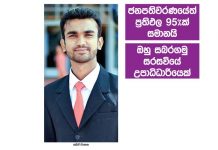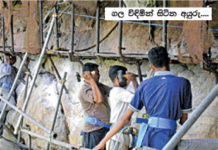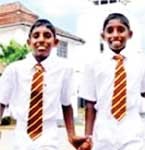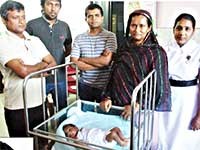Despite an Early Childhood Education (ECE) forming the first stage for young children to acquire life skills to prepare them for school and day-to-day life, Sri Lanka’s preschools have widespread disparities in standards across the country in the absence of a cohesive State policy on preschool education.
Speaking in Parliament this month, Education Minister Dr. Susil Premajayantha disclosed that only 6,000 out of 34,000 preschool teachers and assistant teachers in Sri Lanka possessed diplomas.
Noting that there were 18,800 preschools across the country, he differentiated the five types of ECE centres as privately-run preschools, those operated by organisations, those under Provincial Councils, preschools associated with leading schools, and those run by international schools. Quoting a UNICEF report, he revealed that 20% of children who should have access to preschool education were currently deprived of it.
To address this situation, he said that they would be introducing a foundation course to enable preschool teachers to obtain a diploma, after which they would be able to receive a degree from the Open University of Sri Lanka. Moreover, he noted that work was underway to regularise ECE centres and ensure a uniform syllabus.
Acknowledging that the quality of preschool education in Sri Lanka is a key challenge, Sri Lanka’s National Policy on Early Childhood Care and Development (ECCD) notes that even though some progress has been made in introducing guidelines and standards, the extent to which quality has increased is uneven or generally low.
“On a spectrum of minimum essential elements for high quality, preschools at the lower end of the spectrum would not have proper infrastructure facilities, while the preschools at the other extreme ensure children’s physical well-being but may not offer age-appropriate and individually-appropriate learning programmes,” it notes.
Provincial challenges
Providing insight into the provincial diversity of ECE in the country, Eastern Province Preschool Teachers’ Association (EPPTA) Managing Director Abbas Hithayathullah explained that the province had established a Preschool Education Bureau in 2010, which functioned as an authority, under which preschools and preschool teachers in the province functioned.
He stressed that preschool teachers lacked proper recognition from the Government. Elaborating on the challenges faced by the teachers, he said: “There is no follow-up training for preschool teachers and they don’t have enough education to build up their capacities. In addition, there is a lack of teaching equipment. Moreover, there is no proper guidance for teachers, either nationally or provincially.”
Currently, some preschool teachers are paid an allowance of around Rs. 4,000 while there are others who receive Rs. 2,500 under the ‘Guru Abhimani’ scheme through the Divisional Secretariat.
Hithayathullah further noted that there were also preschools which were operated via funding from parents, which either did not wish to be under the authority or were not eligible for it.
While the EPPTA is providing assistance in capacity building for teachers within the ambit of its limited funds, it is unable to cover all teachers. Accordingly, Hithayathullah noted that a national policy was needed to cover all the provinces, although it may require localisation based on the needs of each province.
Further exemplifying the inconsistencies in policy, he stressed that to ensure child rights, all preschools needed to follow an identical and equal syllabus. “For instance, in the Trincomalee District, there are many preschools which are not following the syllabus and many preschool teachers who are unaware of the syllabus.”
Moreover, the guidance and training provided by the Preschool Education Bureau had not been ensured to all, which showcased a further lack of coordination. Additionally, there is no proper coordination among the field staff of the bureau vis-a-vis the staff of other divisions such as the zonal office.
This highlights the poorly-prepared nature of preschool teachers and supporting care workers to deliver quality preschool experiences.
Sector-wide challenges
In Sri Lanka, preschools operate as commercial businesses, or are run as not-for-profit organisations. The Government sets standards and regulates the sector.
There are several types of preschools operating in Sri Lanka, applying different labels such as preschool, kindergarten, nursery school, Montessori, or child development centre, etc. Their differences range from the environment in which children learn, to the languages and philosophies that guide that learning.
According to UNICEF, a large majority of preschools in Sri Lanka are privately owned and managed, which many parents simply cannot afford. The schools themselves are largely unregulated and not standardised. With a lack of resources and technical guidance, they are unable to provide consistency in content or quality across different parts of the country.
The draft of the National Education Policy Framework (2023-2033) outlines the existing challenges in ECE in the country.
Firstly, coordination among agencies responsible for ECE – the Ministry of Education; National Secretariat for Early Childhood Development (NSECD) of the Ministry Women, Child Affairs, and Social Empowerment; and provincial authorities – remains poor. Secondly, the lack of related legal provisions has ensured that the NSECD has been unable to enforce the set standards.
Another factor is the variability in quality, since the provision of ECE services in Sri Lanka has been largely dependent on non-State resources, with the majority of ECE centres being run as non-State entities. Therefore, followup and oversight of these centres by provincial authorities is not consistent.
State attempts at regulation
Speaking to The Sunday Morning, NSECD Director D.D. Varuni Rasadari explained that the regulation, supervision, and management of preschools and Early Childhood Development Centres (ECDCs) were under the purview of Provincial Councils, under which there were Preschool Units. These units have been established as authorities in some provinces and ensure registration and monitoring of such educational institutions.
She further noted that registration and monitoring of preschools was different in each of the nine provinces given the different statutes. Addressing the challenges in the current situation, she said: “There is a lack of uniformity, which is why the Education Ministry has taken it up to standardise things.”
Rasadari further noted that there were issues at present such as a need for a system to shut down preschools operating sans a prescribed standard, since the laws had not been amended accordingly to enable legal processes in this regard in certain provinces.
“However, compared to previous years, the preschool sector has improved in general,” she contended, although acknowledging the presence of non-registered institutions. She noted that the Education Ministry had been tasked with formulating and implementing a policy for preschools, to which the NSECD was providing assistance as well.
National Institute of Education (NIE) Department of Early Childhood Development and Primary Education Director R.M.K. De Silva told The Sunday Morning that given the absence of a national curriculum for preschools and ECDCs, they had formulated a curriculum framework.
“Since all provinces must work uniformly, there is a demand for a curriculum framework, which we have formulated already, several years ago. However, this is yet to be released. We hope to first review and then reconstruct and redesign this framework before releasing it to the provinces this year.”
She explained that the framework dealt with various aspects such as the types of children who would be included; the policies; areas for development of children; contents of the curriculum, which would require provinces to formulate their curricula within this framework; and guidelines for the latter. She further shared that the provinces had agreed to formulate their respective curricula under this framework.
Uplifting teachers
Meanwhile, State Minister of Women and Child Affairs Geetha Kumarasinghe told The Sunday Morning that the training of preschool teachers was being looked into at the Education Ministry level.
“Teacher training is being conducted by the Education Ministry, with funding support from Non-Governmental Organisations (NGOs). This training course is essential since untrained teachers cannot work at preschools. Teachers are an essential component of preschool education. Only a teacher with this training certificate can function as a preschool teacher.”
She noted that since there were preschool teachers with years of experience and skills despite lacking the certification, they would also be mandated to follow the course.
Addressing the measures taken so far to improve conditions of preschool education, she said: “The biggest change that was effected was increasing the Rs. 2,000 paid to preschool teachers to Rs. 5,000.”
Since preschool education was under Provincial Councils, she opined that the operation of preschools should either be fully under the Central Government or the Provincial Government, noting that this divided authority was what made it difficult to institute proper regulation for preschool education.
Source: themorning





















